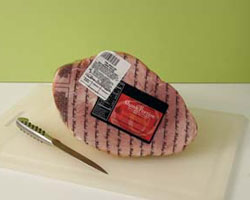Holiday foods: Tips on storage and shelf life
 Released: Nov. 19, 2015
Released: Nov. 19, 2015
OLATHE, Kan. – 'Tis the season to receive delicious food gifts such as sausage, cheese, ham and other tasty items, said Londa Nwadike, the Kansas State University/University of Missouri extension food safety specialist. If you receive a gift of food this holiday season, ensure quality and safety by following the storage guidelines listed below.
– Canned ham: Check the label to determine if refrigeration is needed. If so, it can generally be refrigerated for six to nine months unopened. If refrigeration is not required, the unopened product can be stored for up to two years. (However, the sooner you eat it, the better the quality will be.) After opening, you can store the product safely in the refrigerator for three to four days.
– Country ham: If unsliced, dry-cured ham is shelf-stable for one year. If sliced, ham may be refrigerated for two to three months. Once cooked, it can be refrigerated for three to four days.
– Sausage: Dry fermented sausage that is labeled “Keep refrigerated” can be stored unopened at room temperature for four to six weeks or in the refrigerator for up to six months. Once opened, sausage will keep about two weeks in the refrigerator. If the package says “refrigerate,” keep it refrigerated and use it within three weeks once opened.
– Turkey: Frozen uncooked turkey can be stored in the freezer for up to six months without loss of quality or safety. Otherwise, refrigerate for use within one to two days.
– Game birds: If raw, store in the refrigerator no more than one or two days before cooking, or three days after cooking. Frozen birds will keep up to one year in the freezer.
– Cheese: Most hard or processed cheeses can be safely stored unopened for three to six months in the refrigerator and three to four months if opened.
– Nuts: Refrigerate after opening to preserve freshness and prevent rancidity. Nuts also may be frozen for up to a year after opening to retain quality and freshness.
More information on food safety is available at the K-State Research and Extension website.
-30-
K‑State Research and Extension is a short name for the Kansas State University Agricultural Experiment Station and Cooperative Extension Service, a program designed to generate and distribute useful knowledge for the well‑being of Kansans. Supported by county, state, federal and private funds, the program has county Extension offices, experiment fields, area Extension offices and regional research centers statewide. Its headquarters is on the K‑State campus in Manhattan.
Story by:
Mary Lou Peter
mlpeter@ksu.edu
K-State Research and Extension
For more information:
Londa Nwadike - 913-541-1220 or lnwadike@ksu.edu
